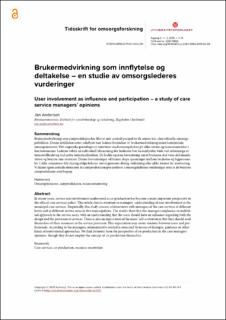Brukermedvirkning som innflytelse og deltakelse - en studie av omsorgslederes vurderinger
Peer reviewed, Journal article
Published version

View/
Date
2019Metadata
Show full item recordCollections
Original version
Tidsskrift for omsorgsforskning. 2019, 5 (2), 1-14. https://doi.org/10.18261/issn.2387-5984-2019-02-05Abstract
Brukermedvirkning som samproduksjon har blitt et mer sentralt perspektiv de senere åra i den offisielle omsorgspolitikken. Denne artikkelen retter søkelyset mot lederes forståelser av brukermedvirkning innen kommunale omsorgstjenester. Det empiriske grunnlaget er intervjuer med omsorgsledere på ulike nivåer og tjenesteområder i fem kommuner. Lederne vektla en individuell tilnærming der brukerne bør ha innflytelse både ved utforminga av tjenestetilbudet og ved sjølve tjenesteutførelsen. De hadde også en forventning om at brukerne skal være deltakende, aktive og benytte sine ressurser. Denne forventningen vil kunne skape spenninger mellom brukerne og fagpersonalet. I slike situasjoner blir styring ifølge lederne utøvd gjennom dialog, veiledning eller ulike former for motivering. Vi finner igjen sentrale elementer fra samproduksjonsperspektivet i omsorgsledernes vurderinger uten at de benytter samproduksjon som begrep. In recent years, service user involvement understood as co-production has become a more important perspective in the official care services policy. This article directs attention to managers’ understanding of user involvement in the municipal care services. Empirically, this study consists of interviews with managers of the care services at different levels and in different service areas in five municipalities. The results show that the managers emphasise an individual approach to the service users, with an understanding that the users should have an influence regarding both the design and the provision of services. There is also an expectation of the users’ self-activation in that they should avail themselves of their resources in the service provision. This expectation may create tensions between users and professionals. According to the managers, administrative control is exercised by means of dialogue, guidance or other kinds of motivational approaches. We find elements from the perspective of co-production in the care managers’ opinions, though they do not employ the concept of co-production themselves.
Description
© 2019 Author(s). This is an open access article distributed under the terms of the Creative Commons CC-BY-NC 4.0
License
